|

January 25, 2008
Miracle of faith: Dedication of
Visitation Clinic gives hope to people of Haiti
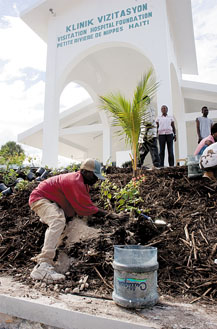 Andy Telli, Tennessee Register Andy Telli, Tennessee Register
PETITE RIVIERE DE NIPPES, Haiti.
The people of Petite Riviere de Nippes in Haiti filled the
narrow, dusty dirt road led by a teen-age boy carrying a
crucifix. They marched under a bright sun and a clear blue sky
from St. Antoine Church in the center of town around deep
potholes, over broken bridges and past small concrete huts,
rusted truck beds, women washing clothes in streams, and
playing children.
At the edge of the town, they
started up a steep drive, at the top of which sat their hope
for a better future.
They crowded onto the porch of the
new Visitation Clinic, with views of the lush mountains on one
side and the shimmering Caribbean on the other, and listened
in the afternoon heat as Theresa Patterson thanked them for
their patience and their faith.
After Bishop Alix Verrier of Les
Cayes, Haiti, blessed and dedicated the building and the
dignitaries were about to cut the ribbon to the clinic,
Patterson and the people of Petite Riviere shared a sense of
jubilation and excitement.
“I got excited … for everybody to
see the clinic after all these years,” said Patterson, who
lives in Nashville, Tenn.
As executive director of the Parish
Twinning Program and the Visitation Hospital Foundation, both
based in Nashville, Patterson has been nurturing her vision to
build a hospital in Haiti for 12 years. The opening of
Visitation Clinic is an important step that Patterson and
others believe will lead to their ultimate goal: the
construction of a 75-bed full service hospital on the
site.
“We haven’t gotten to the mountain
top yet,” Patterson said. But from the clinic, the goal of the
hospital looks much closer.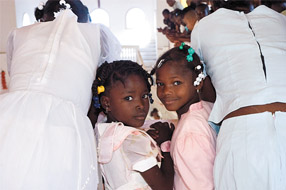
“Until right now, this has just
been ideas and paperwork,” said Dr. Tom Grabenstein, president
of the Visitation Hospital Foundation Board. “Now, it’s
reality.”
After the dedication ceremony was
complete, the people of Petite Riviere filled the new clinic
to get their first, eager glimpse of the building they’re
counting on to improve their lives in many ways.
“There are a lot of people who are
sick and there’s not a hospital in the area, and a lot of
people are dying,” Father Valery Rebecca, pastor of St.
Antoine, said through an interpreter. The clinic will also be
a source of much needed jobs for his people, he
added.
Dr. Grabenstein, who has made at
least 35 trips to Haiti, mostly as part of medical missions
with his fellow parishioners at Immaculate Conception Church
in Clarksville, Tenn., is confident the clinic, and later the
hospital, will change Petite Riviere in many ways. “There are
two good Catholic schools there, but when they graduate, there
is nothing for them to do … but move to Port Au Prince,” he
said.
At times, as many as 60 people were
working on the construction of the clinic, Dr. Grabenstein
said, and within the first year, the clinic will have about 20
employees.
The clinic and hospital also will
attract other businesses to the town, said Father Edwige
Carre, a native of Haiti and the pastor of Holy Name Church in
East Nashville.
“Once you have a clinic here,
automatically you will have people coming here to open
businesses,” explained Father Carre, who traveled to Haiti for
the clinic dedication on Saturday, Jan. 19. “They know if
something happens to them there will be a doctor
here.”
Access to health care is difficult
in Haiti where there are 30 hospitals to serve more than 8
million people.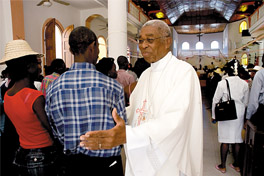
People from all over the area will
come to the clinic and hospital in Petite Riviere, said Dr.
Rony Jean-Francois, the medical director of the new Visitation
Clinic. “We’re going to work a lot for them.”
“He is just so attuned with the
philosophy and mission of the clinic,” Patterson said of Dr.
Jean-Francois.
At the outset, Dr. Jean-Francois
will lead a staff that will include another doctor, three
nurses, a pharmacist, a lab technician, and the clinic
administrator. All but one of them will be
Haitians.
“We felt it was extremely important
to put the majority of the staff into the hands of the Haitian
people,” Patterson said. “It’s got to be their
project.”
The facilities at the clinic will
allow the staff to offer a variety of outpatient, surgical
procedures, Dr. Grabenstein said. It will also offer visiting
teams of American doctors better facilities for outpatient
surgical procedures than have been available to them in the
past, he added.
Dr. Jean-Francois is already
planning on using the clinic to house training programs for
medical staff such as nurses and lab technicians.
Plans also call for the clinic to
be the location of community-based outreach programs such as a
nutrition education and food bank, tuberculosis prevention and
treatment, Vitamin A distribution, STD/AIDS prevention and
treatment, midwifery and breastfeeding education, oral
rehydration in homes, distribution of bed nets to reduce the
spread of malaria and other mosquito-borne diseases, water
purification and an agricultural program.
The clinic is stoking interest from
American doctors and others who want to visit Haiti for
medical missions, Dr. Grabenstein said. “It’s very true, in
this land of medical mission work if you build it they will
come.”
Pressing on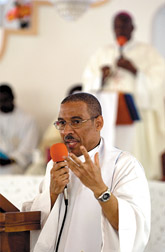
Dr. Jean-Francois has worked in the
area before. As a young doctor, he worked at a hospital
several hours away from Petite Riviere and would visit the
town once a week with a mobile clinic.
He is eager for the clinic to be
expanded to the hospital.
“I want the clinic to become the
Visitation Hospital in one or two years,” he said, offering
high-tech equipment and several areas of specialized
care.
There is a sense of relief that the
clinic is finally done, Dr. Grabenstein said, but he’s looking
forward to the next challenge, which is the hospital. “I want
to press on.”
Patterson said the clinic staff and
the board of the Visitation Hospital Foundation learned a lot
during the construction of the clinic that will help with the
planning of the hospital.
She estimates they will need about
$3 million to build the hospital.
Patterson would like the clinic to
operate for one or two years “to get our feet wet” before
starting construction of the hospital, assuming they can raise
the money, she said. That experience with the clinic will give
them a better idea of what they will need in the
hospital.
‘Absolutely
amazing’
For 30 years, Haiti and its people
have been her love and her passion, Patterson said during the
dedication. That’s how long she has been working with the
Parish Twinning Program, which links parishes throughout the
United States with parishes in Haiti, offering all types of
assistance and support.
Currently, there are 353 Catholic
parishes and church congregations of other denominations in
the U.S. twinned with 210 Haitian parishes and 39 other
projects such as schools, hospitals and nutrition programs,
Patterson said. Some Haitian parishes are twinned with two or
more U.S. parishes, she explained.
And Patterson is always looking for
more parishes in the United States to get involved. “I’ve got
a long list of parishes waiting to be helped,” Patterson
said.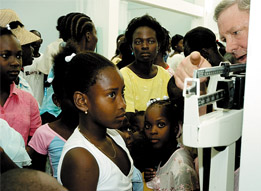
The idea to build a hospital in
Haiti came to Patterson in 1996. But she’s quick to share the
credit.
“It’s not my accomplishment … it’s
all the fantastic people who’ve been so supportive,” Patterson
said.
Several of those people traveled to
Haiti for the dedication.
Patricia Scherer and Jim Scherer of
Nashville made a significant contribution toward the
construction of the clinic. An illness made it impossible for
Patricia Scherer to attend the dedication, but Jim Scherer was
there.
“I was extremely pleased with the
location and the quality of the construction, including even
the landscaping,” Scherer said. “The mountains on one side and
the sea on the other are quite breathtaking. It’s as if hope
is sprouting all over the place for people who have not had
hope for so long.”
Scherer recalled a meeting with the
residents of Petite Riviere eight or nine years ago to discuss
plans to build Visitation Hospital. “I remember one
impassioned plea,” he said of a Haitian man at the meeting.
“‘Please Mr. Jim, build us a hospital.’ He was about crying
when he said it,” said a still emotional Scherer.
“I extend deep appreciation to
Theresa Patterson and her staff and the local people who made
it happen and Twinning Parishes who support the work of
Theresa,” Scherer said.
Mary Clare and Nino Incardona of
Memphis donated a mobile, digital X-ray machine for the clinic
in honor of her brother, the late Dr. George Ludwig, who is
considered the father of ultrasound technology for medical
uses.
“We just felt it was an appropriate
thing to do for my brother,” Mrs. Incardona said.
Their trip for the dedication was
their first to Haiti or the clinic. Mrs. Incardona called the
clinic “absolutely amazing.”
“I didn’t expect it to be as large
… or as sophisticated,” she said.
The dedication was also the first
visit to the clinic for Alan Dooley, the Nashville architect
who donated his services to design it.
“I thought it looked better than I
expected,” said Dooley, who credited the Haitian engineer and
contractor for the project, Abdou Fal, with building a clinic
“well above Haitian standards.”
Dooley designed the clinic with
sustainability in mind.
Because electrical service in Haiti
is often unreliable, Dooley explained, the clinic will receive
all its power from 38 solar panels attached to the roof. There
also is a solar water heater on the roof of the clinic, he
said.
Rainwater from the roof will be
collected, filtered and pumped to the clinic’s water
tower.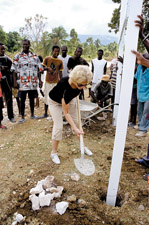
All the appliances selected for use
in the clinic are low energy users and the clinic will use
low-flow toilets, all to reduce the use of power and water as
much as possible, Dooley said.
To help keep the clinic cool, the
central corridor was designed with a tall ceiling lined at the
top with clerestory windows, “which was a common way to cool
basilicas,” Dooley said.
The roof has deep overhangs to
shade the walls, Dooley added.
Even the landscaping was designed
with sustainability in mind. Frances and Mike Sosadeeter of
Sarasota, Fla., who designed the landscaping, used as many
native and edible plants as possible, and used native palm
trees the help shade the clinic, Dooley said.
Others helped with the design by
donating their services, Dooley said, including Nashville
electrical engineer Tony Pezzi; Roger Wehby and Larry Medlin
of Rock City Mechanical; Gould Turner Group Architects who
have experience designing hospitals and medical facilities;
Robert Lownes who created a rendering of the clinic; and
Charlie Wehby, Jack Goodrum, Chris Remke and Joe Connor, who
served in an advisory capacity.
“My work has never been so
appreciated,” Dooley said of the Haitians’ reaction to the
clinic.
‘I always had
faith’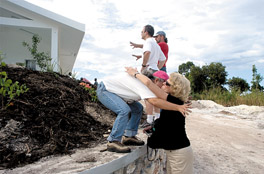
Before the dedication, Bishop
Verrier celebrated a special Mass. During his homily, he
called the dedication a “miracle of faith.”
“The Catholic Church is a family
and all of us our brothers and sisters,” Bishop Verrier told
the overflow crowd of Haitians and Americans. It was the
people’s faith and love “that brings us together
today.”
Despite the many years that it took
to complete the clinic, “I always had faith it was going to
happen,” said Father Rebecca. “I put my hope with God and with
Theresa Patterson.”
Photos by Andy
Telli
A worker finishes the
landscaping at the new Visitation Clinic in Petite Riviere de
Nippes, Haiti. The clinic, which was built by the Visitation
Hospital Foundation, based in Nashville, was dedicated on Jan.
19. A delegation of representatives of the Parish Twinning
Program and the Foundation, traveled to Haiti to attend the
dedication.
The people of Petite Riviere
crowded into St. Antoine Church for a Mass before the
dedication of the Visitation clinic. Many in the crowd (photos
above and at left) were forced to watch the Mass standing in
the church balcony.
Bishop Alix Verrier of Les
Cayes, Haiti, extends the sign of peace during the Mass. His
diocese donated the land where the clinic was built.
Father Edwige Carre, a native of
Haiti and pastor of Holy Name Church in Nashville, translates
the bishop’s homily for the Americans who traveled to Haiti
for the clinic dedication.
Nashville Bill Link, shows some
of the children of Petite Riviere how to use the scale in the
new clinic. After the dedication ceremonies, the residents of
the area, flooded into the clinic for their first look at the
facility, which will provide much needed health care in the
region.
Theresa Patterson, executive
director of the Parish Twinning Program and Visitation
Hospital Foundation, scoops in the first shovel full of
concrete for the sign at the end of the drive leading to the
Visitation Clinic. The people of Petite Riviere, who were
erecting the sign when Patterson arrived, watch.
Patterson greets Frances
Sosadeeter, who with her husband Mike, (talking in the
background with Nashville architect Alan Dooley) designed the
landscaping. Mrs. Sosadeeter is the coordinator of the Parish
Twinning Program in Spanish-speaking countries.
Click here to view Visitation Hospital
Dedication Photos.
| 




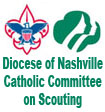

 Andy Telli, Tennessee Register
Andy Telli, Tennessee Register




